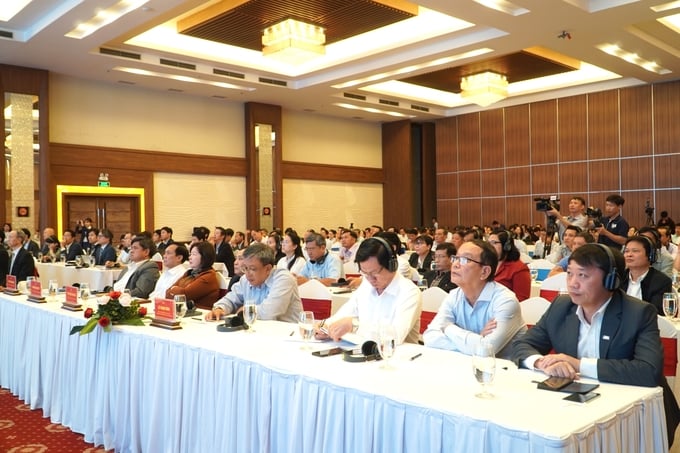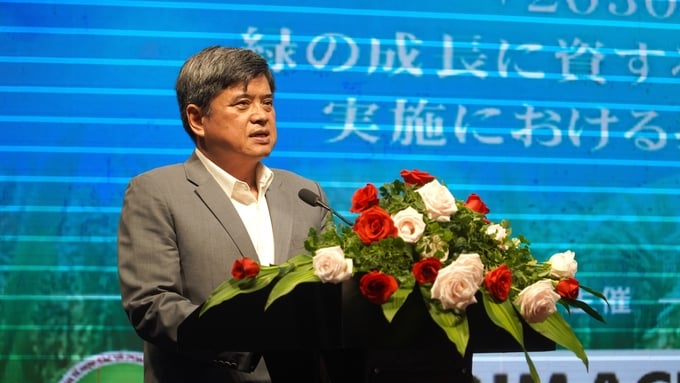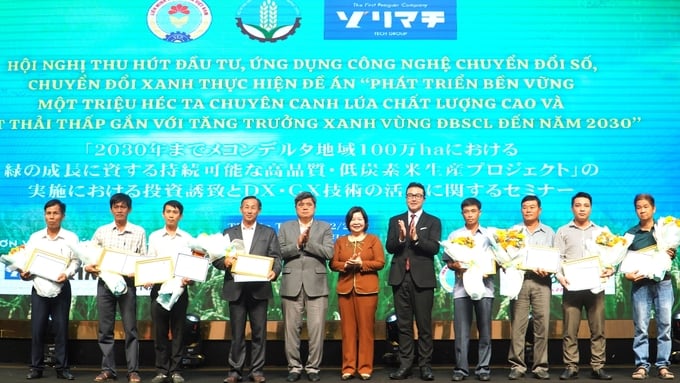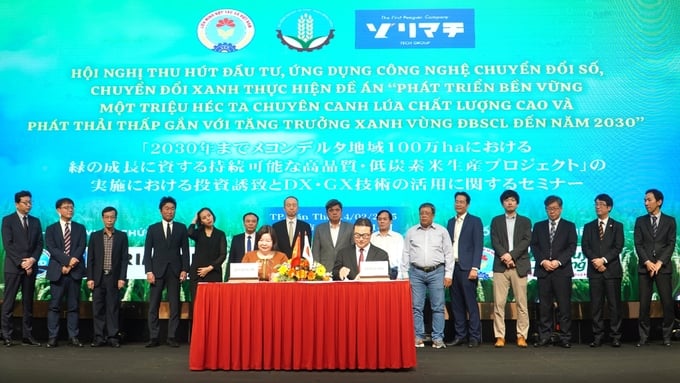June 3, 2025 | 14:48 GMT +7
June 3, 2025 | 14:48 GMT +7
Hotline: 0913.378.918
June 3, 2025 | 14:48 GMT +7
Hotline: 0913.378.918
On February 14, the Department of Cooperatives and Rural Development (Ministry of Agriculture and Rural Development) coordinates with Sorimachi Vietnam Co., Ltd. to organize a conference on attracting investment, applying digital transformation and green transformation technologies to implement the Scheme "Sustainable development of 1 million ha of high-quality and low-emission rice cultivation associated with green growth in the Mekong Delta region by 2030".
The conference is chaired by Deputy Minister of Agriculture and Rural Development Tran Thanh Nam, Chairman of the Vietnam Cooperative Alliance Cao Xuan Thu Van and Hideki Sorimachi, President of Sorimachi Japan.

Many policy makers along with domestic and foreign enterprises, international cooperation organizations and cooperatives in the Mekong Delta region attended the conference. Photo: Kim Anh.
Information from the Department of Cooperatives and Rural Development shows that the 1 million ha of high-quality rice Scheme can achieve greater success if the prime focus is on attracting investment in 3 important technology areas, including the technology applied in the technical process according to Decision No. 145/QD-TT-CLT issued by the Department of Crop Production, the technology applied to 100% of specialized production areas, with linkage between enterprises and cooperatives, and the technology for measuring, verifying and reporting (MRV) emission reduction results.
“At present, farmers have recognized, trusted and unanimously implemented the Scheme’s farming process. In the next phase, the Scheme will focus on applying technology to reduce costs, optimize production time, increase value and ensure farmers' health,” said Deputy Minister Tran Thanh Nam.

Deputy Minister of Agriculture and Rural Development Tran Thanh Nam calls for investment from corporations and enterprises in the technology sector for the 1 million ha high-quality rice Scheme. Photo: Kim Anh.
The application of technology to rice production in the Mekong Delta still has a lot of fiscal space for development. The 1 million ha high-quality rice Scheme is expected to attract over 2 million farmers to join cooperatives. By 2030, there will be approximately 1,230 cooperatives and 210 rice trading enterprises accompanying the Scheme, which creates a great demand for investment in technology.
From the perspective of Deputy Minister Tran Thanh Nam, the Scheme should encourage farmers to increase agricultural services and shift manual labor to technology application. The leader of the Ministry of Agriculture and Rural Development is expecting more domestic and foreign corporations and enterprises with experience to invest in the technology sector for the Scheme. The main focuses include digital technology, smart technology, and technologies to process agricultural by-products.

Leaders of the Ministry of Agriculture and Rural Development and the Vietnam Cooperative Alliance awarded cooperatives pioneering in applying digital transformation software. Photo: Kim Anh.
Deputy Minister Tran Thanh Nam acknowledges and appreciates the support of Sorimachi Group in deploying the FaceFarm production diary software and cooperative accounting software (WACA) for Vietnamese agricultural cooperatives.
The Deputy Minister also suggests that Sorimachi Group as well as several Japanese enterprises participate in deploying smart agricultural solutions for the 1 million ha of high-quality rice Scheme as this is one of the fields in which Japanese enterprises have a lot of experience and effective models.
The Ministry of Agriculture and Rural Development along with related ministries and branches are currently implementing the Scheme’s operating mechanism, including the infrastructure investment mechanism for participating localities. It has also coordinated with financial institutions to continue discussing technical measures to unify the measurement, reporting, and verification (MRV) plan to meet international standards.
It is expected that in April 2025, the Ministry of Agriculture and Rural Development will have a final meeting with the World Bank (WB) to unify the MRV plan. At the same time, it will work with Vietnamese credit institutions to unify the mechanism for implementing preferential credit programs for enterprises and cooperatives participating in the Scheme.

Memorandum of Understanding signing ceremony between the Department of Cooperatives and Rural Development, Vietnam Cooperative Alliance and Sorimachi Group. Photo: Kim Anh.
One of the important highlights of the conference was the ceremony to honor eight typical cooperatives in the Mekong Delta that are at the forefront of innovation, with the award "Pioneering cooperative applying digital transformation software". The conference also witnessed the signing of a memorandum of understanding between the Department of Cooperative Economics and Rural Development (Ministry of Agriculture and Rural Development), the Vietnam Cooperative Alliance and Sorimachi Group.
This is an important milestone affirming the commitment to long-term cooperation in the process of digital transformation and green transformation for Vietnam’s agriculture. This agreement also creates a solid foundation for coordination between units, opening up sustainable development opportunities for the agricultural cooperative ecosystem.
Translated by Samuel Pham

(VAN) TTC AgriS and IFC signed a strategic partnership to develop a sustainable agricultural value chain, aiming to achieve the Net Zero target by 2035.

(VAN) Seafood by-products are opening a new path, combining green growth and technological innovation to enhance the industry's value.

(VAN) Mr. Nguyen Thanh Cong, Vice Chairman of the Son La Provincial People's Committee, reflects on Son La’s journey from barren hills to fruitful orchards after a decade of hard work.

(VAN) FAO’s Director-General addresses the 5th Baghdad International Water Conference.
/2025/05/26/1716-4-nongnghiep-191706.jpg)
(VAN) Chain linkages, technological innovation, and raw material zoning are three strategic pillars for the coconut industry to strongly develop and elevate its position on the global agricultural map.
![Advanced mariculture – an inevitable trend: [4] Accompanied by scientists](https://t.ex-cdn.com/nongnghiepmoitruong.vn/608w/files/sohk/2025/05/13/1941-pgsts-vo-van-nha-140958_717.jpg)
(VAN) According to Assoc. Prof. Dr. Vo Van Nha, Director of the RIA III, the development of advanced offshore mariculture is no longer an option but an essential path for Vietnam’s fisheries sector.

(VAN) Vietnam is intensifying the development of mollusk farming areas that meet international standards, aiming for sustainable growth and enhancing its export position in the global seafood market.